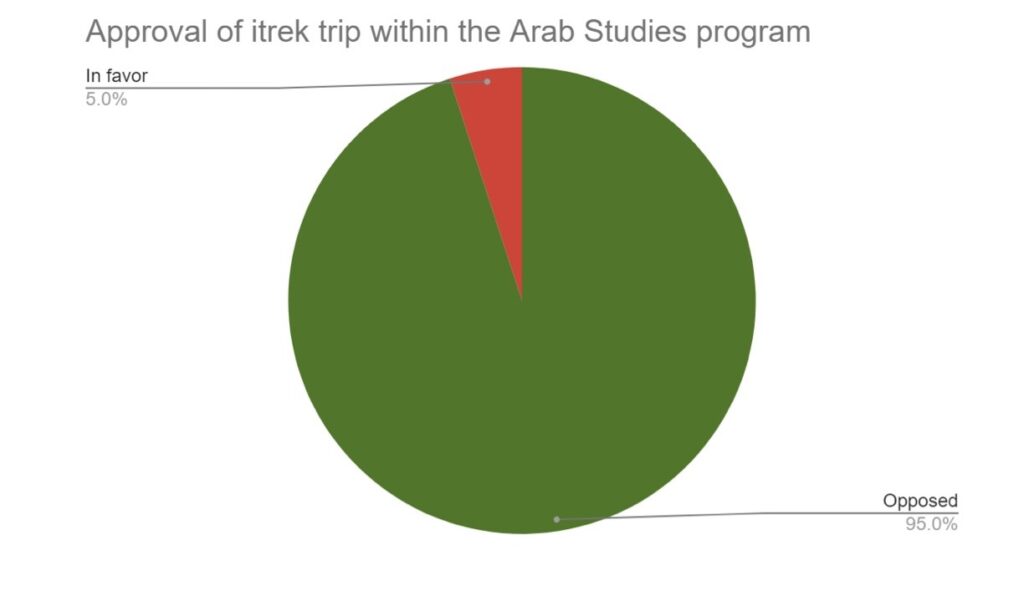The Senate Leadership Committee (SLC) of Georgetown’s Graduate Student Government (GradGov) passed and later rescinded a vote of no confidence against the president and vice president of GradGov last week in an inquiry into concerns regarding funding and sponsorship of a planned student trip to Israel. The trip also faced controversy over its accessibility for students of Palestinian and Arab descent.
For the last three years, President Jonah Klempner (MAAS ’22, LLM ’22) has been organizing the trip in collaboration with itrek, an organization that sponsors graduate students across the country on educational trips to Israel.
“This is something that Georgetown students have led many times in the past, and over COVID I was one of those students,” Klempner said in an interview with the Voice.
After the pandemic delayed the original trip plans, Klempner expected itrek to subsidize nearly $250,000 for a spring break 2022 trip. Klempner himself would not receive the funds. Prior to winter break of 2021, Klempner spoke briefly at a Senate meeting to introduce itrek and propose the use of GradGov funds for the trip. According to Senator Jillian Robins (MAAS ’22), there were no notes or minutes taken during the meeting, and many senators at the time were left with questions.
As students returned to campus this January, a proposed, but unfinished, budget draft allocated $30,000 of GradGov’s $150,000 semesterly budget for trip expenses. It was at this point that other senators began to express their concerns.
“We knew what this organization was, we knew what the nature of these trips were, and we knew at that point, we didn’t want student money going into it,” Robins said.
In a survey Nooran Alhamdan (MAAS ’22) sent to students in the Arab Studies program the week after returning to campus, 95 percent of respondents were against the itrek trip.

When asked “Do you support the GradGov trip to Israel (iTrek),” 57 out of the 60 2022 cohort members said no, while 3 responded yes, according to data acquired from Nooran Alhamdan, a graduate student in the Master of Arts in Arab Studies program. Graphic by Nora Scully.
After seeing the poll, Klempner was determined to change minds. In an email sent to the Senate on Jan. 31, he threatened to quit the Arab Studies program just one semester before graduating and resign as GradGov president if he was unable to convince one-third of his peers in the Arab Studies program to support the trip.
Even if that happened, he said he would continue to lead the trip independently of GradGov and the program. “One way or another this trip is going forward,” Klempner wrote.
As students within the program raised concerns about the trip, SLC members began to notice worrying details about the proposed allocation of funds.
A Feb. 1 email sent by the executive board’s director of finance to the SLC and obtained by the Voice indicated that in the expenses of the trip, Klempner and Vice President Moses Ruharo (MSFS ’22) were listed as “free riders.” The email noted that all their expenses—including transportation, meals, visa costs, and single room accommodation—would be covered by itrek. Other graduate students would have had to pay those costs out of pocket.
GradGov executives sent the proposal to advisors from the Graduate School of Arts and Sciences (GSAS), who exert oversight authority over budget allocation, on Jan. 26. The GSAS advisors expressed concerns about the costs of the trip, noted that the required review processes had not occurred, and withdrew university funding, according to a university spokesperson.
The SLC conveyed similar concerns about the fast-tracked budget process, especially in regards to the creation of Klempner’s budget committee and the unequal appropriation of funds. On Feb. 1, the SLC held an emergency meeting to discuss the issue and vote on recommendations for Klempner and Ruharo. In a letter addressed to the full Senate, the SLC argued that special compensation for the two executives was a direct violation of the GradGov constitution, which states that “officers of the Executive Board shall not take GradGov funds as monetary compensation.”
A second charge noted in the letter that the funds were inappropriately allocated because they were approved without full Senate approval, a constitutional violation when the Senate is not in summer recess. Citing these two violations, the SLC unanimously passed the vote of no confidence, with one member absent.
“[The] allegations were well-meaning misunderstandings, but they are unfounded and baseless,” Klempner said in an interview with the Voice. “I have received no benefits from being GradGov president, and I will receive no benefits from being GradGov president from itrek.”
On Feb. 2, Klempner announced in a discussion with GradGov senators that the trip to Israel would no longer receive any funding from GradGov or be affiliated with the university in any way. He reiterated that he would continue to work with itrek to ensure the trip proceeds regardless of university support.
“It will still be a valuable educational experience. It will be eye-opening for many. It will be life changing for a few, as it was for me,” Klempner said. He described the trip as a “fact-finding mission” for students to gain a better understanding of the Israel-Palestine conflict.
The SLC unanimously voted to revoke both charges soon after the announcement, according to an email acquired by the Voice. Both charges had revolved around the proposed allocation of university funds. Once the university withdrew proposed GradGov funding from the trip, these issues were resolved, according to a senator on the SLC who wished to remain anonymous.
Although the funding question had been resolved, concerns remained about the idea of a student trip to Israel. During the Feb. 2 discussion, some senators described Israel as “an apartheid state” and said that using funds from a pro-Israel organization like itrek to meet with and speak to Palestinians—including homeowners in Sheikh Jarrah, as mentioned in the Jan. 31 email from Klempner—about the oppression on the part of Israel would be unjust.
“No one needs to sit in someone’s living room. It’s not a human zoo, you don’t just go to people’s houses in an area where they’ve just gone through literal trauma,” Dina El-Baradie, a PhD student in Middle Eastern history, said in an interview with the Voice about her disapproval of the trip. “Their houses are taken away, so many deaths have occurred, murders from the [Israel Defense Forces].”
Others suggested that in financing the trip, itrek hopes to influence the students’ views on the Israel-Palestine conflict.
“They say they’re apolitical, and they give me money,” Klempner said when asked why GradGov did not find another country to travel to in the Feb. 2 meeting. “Find me another way to get $250,000.”
Some brought up concerns about the equal ability of all students to physically travel to Israel. According to Klempner, however, the trip was intended to be accessible to all graduate students with passports. “I made sure GradGov and the Graduate School’s funding of this trip was contingent on giving everyone an equal opportunity to come at an affordable rate regardless of program,” he wrote in the Jan. 31 email.
Nevertheless, Israeli law prohibits travel to those that have made public statements against Israel. In recent years, travel for Palestinians has been complicated and inaccessible, and approval has been an opaque process.
“It genuinely should not be the responsibility of GradGov to lead an abroad trip, period. It’s very costly–we’re in a global pandemic–but it’s also unrealistic in terms of immigration,” Nisrine Hilizah (MAAS ’23) said in an interview with the Voice. “It’s not an equal playing field.”
Klempner acknowledged in the Feb. 2 discussion that students of Palestinian or Arab descent are likely to face dehumanizing treatment on Israeli soil, perhaps even being “searched” or “degraded” at the Israeli airport upon arrival.
“They couldn’t see the injustice of their ability to go on this trip while people like myself aren’t even able to visit their parent’s homeland,” Alhamdan, who is Palestinian-American, said in an interview with the Voice.
Klempner committed to working with students personally to ensure there are no problems with their visas, and so that they feel safe making the trip. “But I understand why there is that hesitation and fear,” Klempner added.
Klempner and other members of the executive board also pledged to improve communication with both the Senate and the general graduate student body. In an interview with the Voice, Klempner committed to sending shorter, more digestible recap emails of meetings and providing minutes and recordings for senators who could not attend.
Students and senators alike remain wary of the problems this incident posed. “When it comes to student funding going toward activities that definitely can be viewed as controversial, unethical, inherently political—there has to be far more caution on the part of GradGov,” Alhamdan said.
Correction: The article has been updated to reflect the class years of Klemper, Nooran Alhamdan, and Nisrine Hilizah. It has also been updated to distinguish proposed allocation of funds and that Klemper did not chair a special budget committee.






